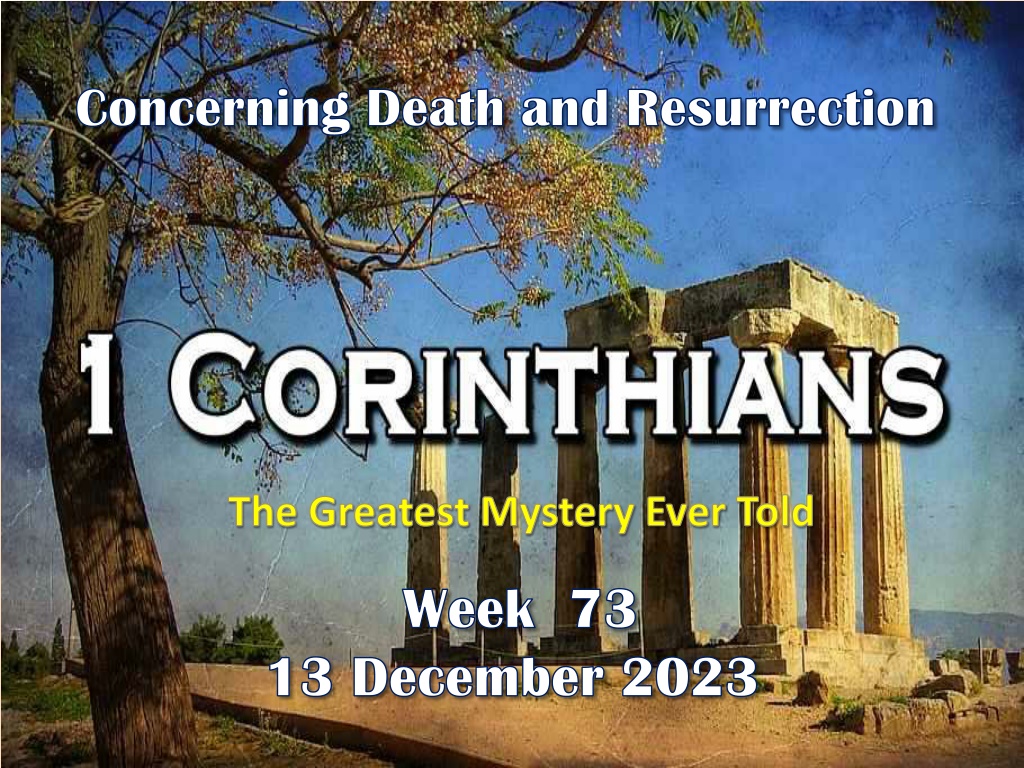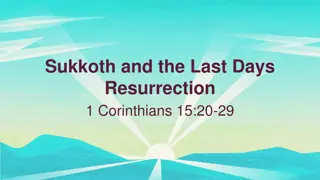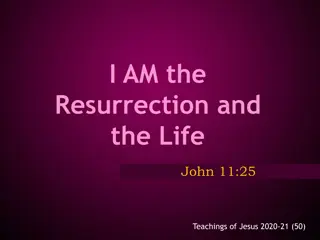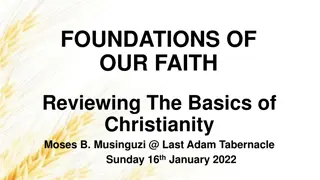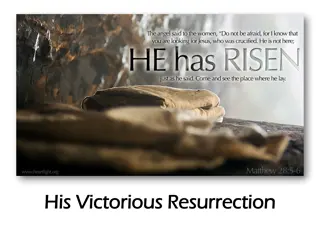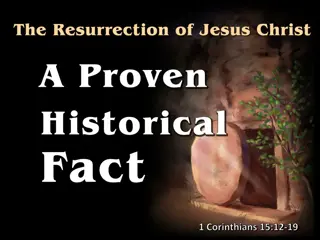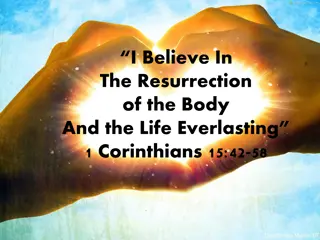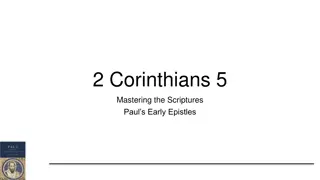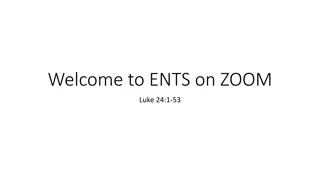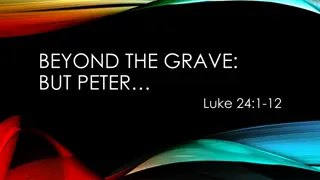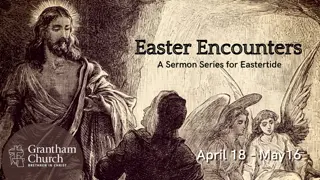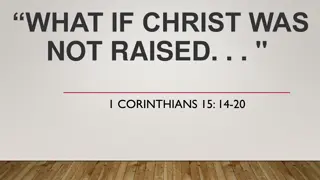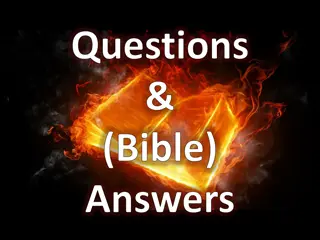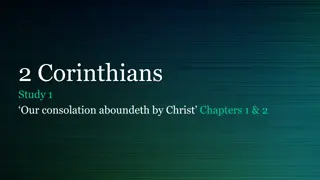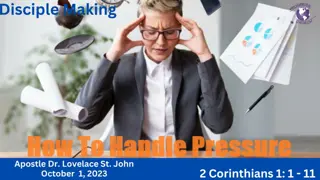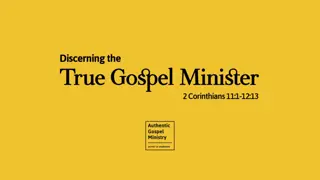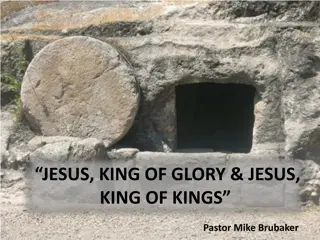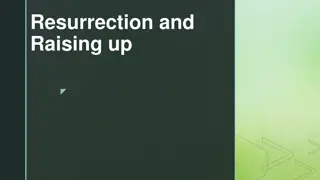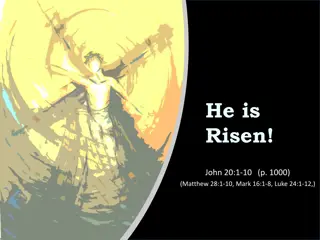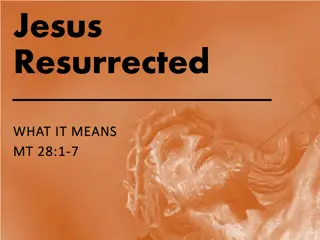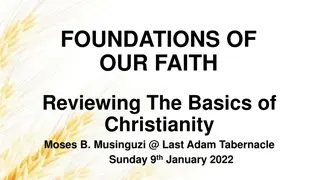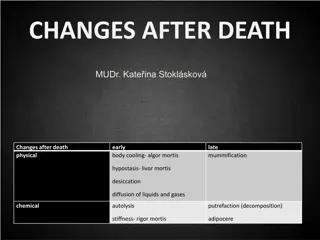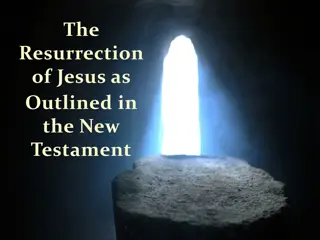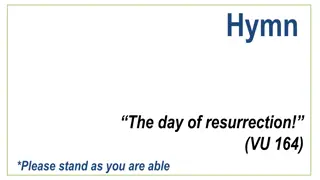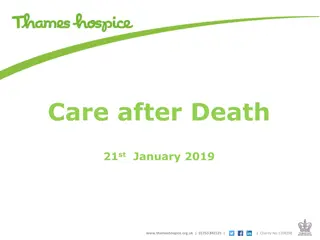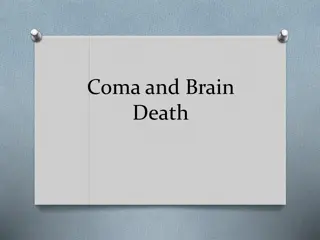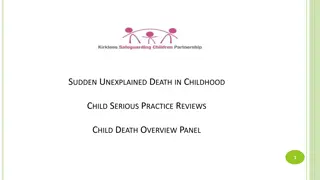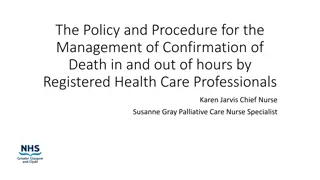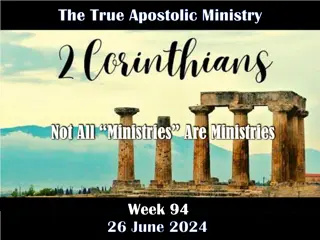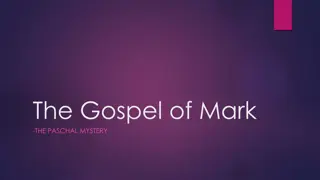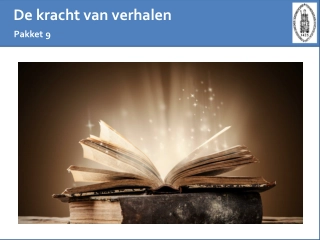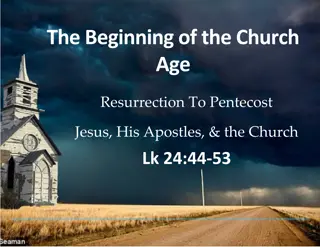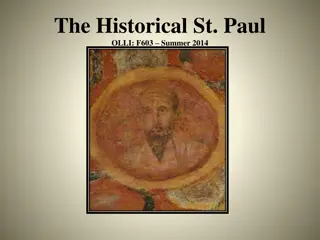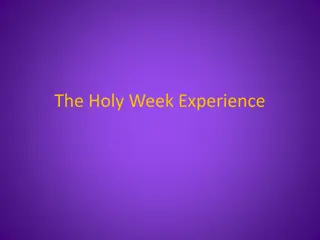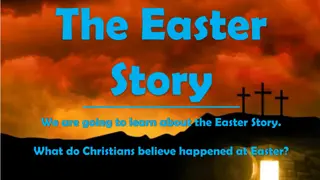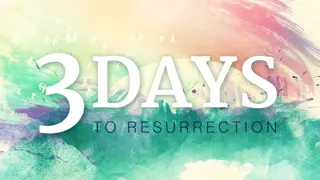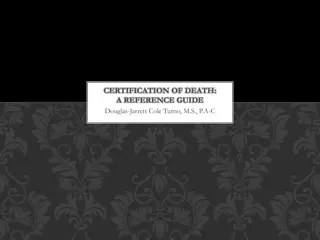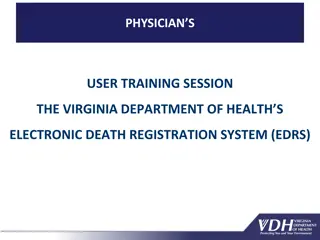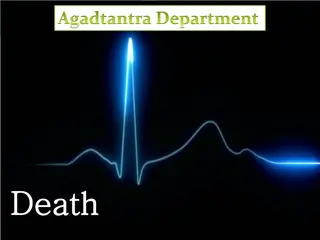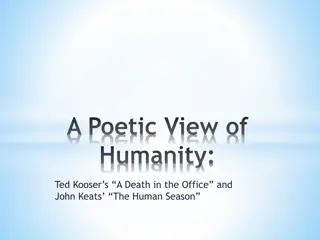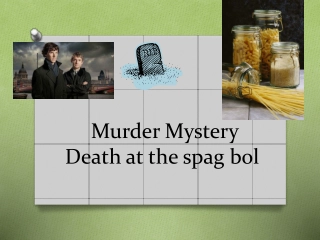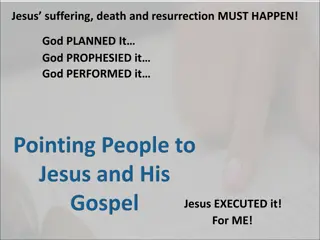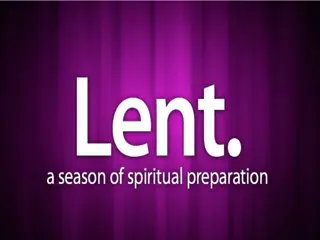Unveiling the Mystery of Death and Resurrection in Corinthians
Delve into the profound teachings of 1 Corinthians, where the focus is on Christian conduct, unity, and spiritual growth within the local church. Explore the transformative power of the resurrection, victory over sin and death through Christ, and the eternal significance of faith and commitment. Uncover the answers to crucial questions about life, salvation, prayer, and the believers' future resurrection.
Download Presentation

Please find below an Image/Link to download the presentation.
The content on the website is provided AS IS for your information and personal use only. It may not be sold, licensed, or shared on other websites without obtaining consent from the author. Download presentation by click this link. If you encounter any issues during the download, it is possible that the publisher has removed the file from their server.
E N D
Presentation Transcript
Concerning Death and Resurrection Concerning Death and Resurrection The Greatest Mystery Ever Told Week Week 73 73 13 December 2023 13 December 2023
1 CORINTHIANS INTRODUCTION As we continue our study in First Corinthians, we want to remember that the theme of this letter revolves around Christian Conduct in the local church and how it influences unity,discipline,andspiritual growth Again, the primary issue in the church at Corinth was Progressive Sanctification the development of Holy character and the application of Christian principles and discipline on an individual and corporate level. So the corrective in this letter is behavior rather than doctrine. In our study, Paul presents a powerful message of hope, assurance, and encouragement, highlights the transformative nature of the resurrection, our victory over sin and death through Jesus Christ, and encourages us to be stand firm in our faith and commit fully to the work of the Lord, since our efforts have lasting significance in God's eternal plan.
1 CORINTHIANS - LESSON OVERVIEW Swindoll opens our lesson by saying . . . Everybody loves a mystery, but nobody likes being left in the dark. Who among us would be content watching a Sherlock Holmes mystery that cuts off ten minutes before the ending. Leaving us wondering how a great detective cleverly pieced together the seemingly unintelligible clues? Or who could tolerate a clever riddle with no solution? Who relishes problems without answers? Or even jokes with no punch line? We all want to be in on the secret, kept in the loop, privy to insider information. The Christian faith answers a lot of nagging questions about life: What is God like? Where did we come from? What s wrong with us? Will it ever get fixed? What happens after death? What must I do to be saved?
1 CORINTHIANS - LESSON OVERVIEW While, the Christian faith answers many questions, its claims can lead to even deeper questions: How can I be sure of my salvation? How does prayer work with an all-knowing, sovereign God? How are we raise up from the dead? In the previous lesson, Paul began answering some of the Corinthians questions regarding the doctrine of the believers future bodily resurrection (15:35-49). While, he described the nature of the resurrection body, yet another nagging question still remains. If all the dead in Christ are to be raised upon His return, what about those believers in Christ who have not yet died? Will they miss out on this transformation and glorification?
1 CORINTHIANS - LESSON OVERVIEW Will they get stuck in their mortal bodies, having to die before experiencing the glories of eternal life? To this question Paul response with a resounding No. In verses 50-58, Paul addresses the destiny of those believers who are still living when Christ descends from heaven at His secondcoming.
1 CORINTHIANS 15:50 50Now this I say, brethren, that flesh and blood cannot inherit the kingdom of God; nor does corruption inherit incorruption.
1 CORINTHIANS 15:50 Paul begins this discourse by addressing the question of the resurrection of believers who are still alive at the return of Christ by setting forth a principle: Flesh and blood cannot inherit the kingdom of God; nor does corruption inherit incorruption. While this statement may seem contradictory to Paul s earlier teaching in this chapter, that we will inherit the kingdom of God in new bodies. Paul doesn t say a body cannot inherit the kingdom of God. Since Jesus himself had been raised in bodily form, and ascended to heaven in a body (Acts 1:9). Remember when Jesus was resurrected, he had flesh and bones (Luke 24:39), a real physical body, though it had become perfect and immortal.
1 CORINTHIANS 15:50 So we would misinterpret Paul s words if we conclude that only immaterial spirits are fit for heaven. Paul s parallelism here helps us understand two things: We see that the kingdom of God and the imperishable stand in parallel to each other. The quality of the coming kingdom of God, in contrast with the kingdom of earth, will be imperishable. Likewise, the bodies of believers dwelling in the kingdom of God will conform to this imperishable, incorruptible quality.
1 CORINTHIANS 15:50 Paul says that in the resurrection of the dead, the body that died was perishable, but it will be raised imperishable (15:42). So when Paul says flesh and blood cannot inherit the kingdom of heaven, he is not referring to physical bodies, but to bodies that share the same fallen and physically corruptible nature of Adam. So by extension, Paul is also referring to humanity s fallen, mortal, perishable condition in this world. Accordingly, Paul assures his readers that the kind of bodies we have on earth perishable, and susceptible to pain, suffering, and death cannot inherit the kingdom of God.
1 CORINTHIANS 15:50 A kingdom that will be characterized by immortality and eternality, and that will also exclude things that deteriorate and die. The question still remains, will those who are alive in their mortal, flesh and blood bodies at the return of Christ be keep out of the kingdom of God? Will they have to die first and then be raised? Will they be part of a lower-quality kingdom, missing out on the infinite glories of heaven? Paul answers this question with what theologians call the doctrine of the Rapture.
1 CORINTHIANS 15:51-53 51 Behold, I tell you a mystery: We shall not all sleep, but we shall all be changed 52 in a moment, in the twinkling of an eye, at the last trumpet. For the trumpet will sound, and the dead will be raised incorruptible, and we shall be changed. 53 For this corruptible must put on incorruption, and this mortal must put on immortality.
1 CORINTHIANS 15:51-53 Paul, now, reveals this mystery a truth not previously revealed,that solves the problem of what will happen to living saints when Christ returns. He says not all believers will sleep, meaning not everybody will die physically prior to entering the kingdom of God. Yet all believers will be changed (15:51) transformed from their flesh and blood existence into an immortal form that can dwell throughout eternity in heaven. Not all believers will enter this new condition through resurrection: those who are still alive when Christ returns to remove church will be transformed without having died. So quick will be this transformation from mortal to immortal for living believers that it will be like the scarcely noticeable blink of an eye (15:52).
1 CORINTHIANS 15:51-53 The transformation will be heralded by the resonant sound of the last trumpet and immediately preceded by the resurrection of dead believers in the new, imperishable bodies described in verses 35-49. In the Bible, trumpets are used for various purposes. The trumpet blast gathered the people of Israel to meet their God (Exodus 19:16-19); heralded the coming Day of the Lord a time of fierce wrath and judgment on the earth (Joel 2:1). So, by referring to the last trumpet, Paul looks forward to the end times, the final gathering of the rescued saints prior to the judgements of the Great Tribulation (Rev. 3:10).
1 CORINTHIANS 15:51-53 At that time, those living in their perishable flesh and blood bodies will put on imperishable bodies, then clothed in immortality instead of corruption (15:53), they will be caught up with the resurrected saints in the clouds. So, one way or another either by resurrection or just transformation the results will be the same. All believers in Christ will be changed and raptured caught up in the sky to be with the Lord (1Thes. 4:15-17). Then Christ will fulfill His promise, in John 14:2-3 > In my Father s house are many mansions; if it were not so, I would have told you. I go to prepare a place for you. And if I go and prepare a place for you I will come again and receive you to Myself; that where I am there you may be also.
1 CORINTHIANS 15:54-58 54 So when this corruptible has put on incorruption, and this mortal has put on immortality, then shall be brought to pass the saying that is written: Death is swallowed up in victory. 55 O Death, where is your sting? O Hades, where is your victory? 56 The sting of death is sin, and the strength of sin is the law. 57 But thanks be to God, who gives us the victory through our Lord Jesus Christ. 58 Therefore, my beloved brethren, be steadfast, immovable, always abounding in the work of the Lord, knowing that your labor is not in vain in the Lord.
1 CORINTHIANS 15:54-58 Having revealed the mystery of what will happen to living believers when Christ returns, Paul immediately sounds the signal of victory over the greatest enemies of humanity: sin and death. The damnable duo of destruction that currently reigns over our mortal lives of flesh and blood. Ever since Adam and Eve abdicated their dominion over this world by succumbing to Satan s temptation (Gen. 1:28- 30; 3:17-19), death has reigned over all humanity. However, when that trumpet sounds, God will deal the fatal blow to sin and death and our perishable, mortal bodies will be transformed into imperishable, immortal bodies incapable of sin, suffering, or corruption (15:54).
1 CORINTHIANS 15:54-58 On that day death itself will be reversed and God s plan of universal redemption will be put into motion (Rom. 8:18- 23), and death s apparent victory will be undone. Paul says that on that day death itself will be conquered, its deadly stinger finally removed, its power forever crushed (15:55). After the resurrection and rapture of believers, never again will we grieve the loss of a loved one. Never again will we worry about terminal diseases. Never again will we cope with the frailties of old age. Never again will we plan funerals, execute wills, and worry about the loved ones we leave behind.
1 CORINTHIANS 15:54-58 Never again will we need to nurse the lingering emptiness and grief we feel when a spouse, a child, or a parent is taken from us by the enemy. On that day, death s sting will be permanently gone. What a magnificent promise! Paul explains that death gains its authority over man through sin (15:56). By the Law, sin is strengthened, as it condemns us before a holy and righteous God, reminding us that the wages of sin is death (Rom. 6:23). When we are raised up from the grave or transformed and caught up from the earth, the impulse to sin will be eradicated. Never again will we suffer as victims of robberies or violent crime.
1 CORINTHIANS 15:54-58 Never again will people devastate families through incurable additions. Never again will homes be broken, children be abused, families abandoned. Never again will we watch helplessly as society deteriorates around us. Instead, sin itself will be conquered by life, immortality, and eternal righteousness a victory over sin and death that only comes through our Lord Jesus Christ (15:57). These eternal promises are enough to fuel our hope for a lifetime. That our abiding hunger for a world set right will one day be satisfied with the resurrection, and the world to come. Paul concludes this discussion on our future hope with a hard look inward and outward.
1 CORINTHIANS 15:54-58 In light of the hope of our resurrection made sure by Christ s resurrection we are to be steadfast, immovable, abounding in God s work with full assurance that there will be a reward for our labors (15:58). And because all of Scripture is given by God so that the man of God may be adequate, equipped for every good work (2Tim. 3:17), it should come as no surprise that these prophetic truths would lead to practical applications. God did not reveal details of His end times so we could get our prophecy charts right. He gave them so we could get our lives right.
APPLICATIONS OF THE LESSON Our Response to the Mystery
APPLICATION OUR RESPONSE TO THE MYSTERY Swindoll says Paul s teaching about our resurrection and rapture, and it implications for the Christian s victory over sin and death, leads to a practical response. It isn t just a sweet by-and-by truth to ponder during quit moments when we have time to theorize about things that are temporary or passing. This is life-changing truth meant to affect the decisions we make Monday through Sunday. We are not to set dates for the Rapture, quit our jobs, sell all of our possession and wait for the loud blast of the last trumpet. Jesus told us that no one except the Father knows the season, day, or the hour of His return (Matthew 24:36, 42; Acts 1:6-7). So from a human perspective Christ could return at any moment.
APPLICATION OUR RESPONSE TO THE MYSTERY Accordingly, Paul encourages believers to live in light of the Lord s imminent return, to be steadfast, immovable, always abounding in the work of the Lord, knowing that your toil is not in vain in the Lord (15:58). Therefore, in response to the doctrine of our any-moment resurrection, transformation, and catching-up to be with Christ, we should: remain firm in our faith, unyielding in our convictions, andflourishing in our Christian lives. We should live with the Lord s reward for us in view, fulfilling God s unique calling in our lives. When the trumpet sounds, it will be too late, to give attention to our spiritual lives. So, let s not squander the opportunity to serve the Lord out of gratitude for what He has done, and what He will do.
APPLICATION OUR RESPONSE TO THE MYSTERY Let s live as if today could be our last chance to invest time in life s most significant things. What would schedule today look like if we knew Christ was returning at eleven o clock tonight? Ok! But He is coming back! At which time we will be transformed into our immortal bodies to spend eternity with Him wherever He goes. When He does come will he find us: Abounding in His work? Standing steadfast? Unable to be swayed? In other words, are we living in light of His return?
NEXT CLASS 10 January 2024 Before next class, read the below chapters in Before next class, read the below chapters in the NKJV and in one other versions of the Bible, the NKJV and in one other versions of the Bible, i.e., KJV, NRSV, NIV, CEV, etc i.e., KJV, NRSV, NIV, CEV, etc Chapter 16:1 12 Antidotes to the Poison of Parochialism
